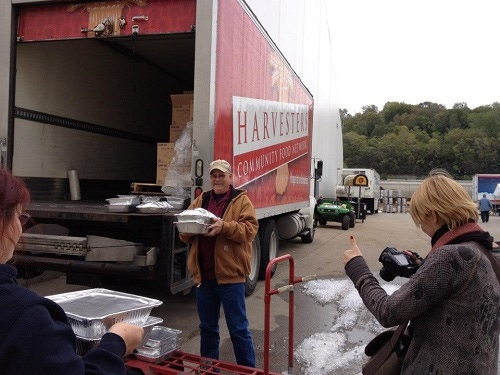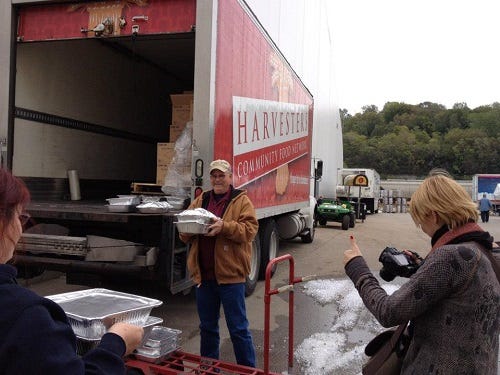
The last couple weeks have been busy for Kansas City. Following a win by the Royals, earning them a place in the playoffs for the first time since 1985, Kansas Citians had another Royal event this weekend. Visitors from across the world filled the West Bottoms district to be greeted by the enticing aroma of barbecue for a long-standing Kansas City tradition – the American Royal World Series of Barbecue.

18 WHEELS OF BBQ: Once participants turn in food for the competition, it's in Harvesters Community Food Network's hands. The Network decides which foods can be packaged and frozen for donation, and loads it on to a refrigerated 18-wheeler truck to transport it. Photo courtesy of Jen Brand.
Barbecue has been a Kansas City mainstay for years – since Henry Perry, considered the king of barbecue, established his roots with the first commercial barbecue restaurant in K.C. in the early 1900s, eventually handed down to Charlie Bryant and then his brother Arthur. The restaurant, Arthur Bryant's, is now considered the most famous barbecue restaurant in the U.S., and is where dignitaries and U.S. Presidents dine when they're in town.
In 1980, that tradition continued with the American Royal Barbecue. Since then, it's grown to become the world's most highly-attended barbecue event, covering over 54 acres of the historic Stockyards District, and drawing over 560 barbecue teams from around the world.
"It's the contest that everyone up and coming in barbecue wants to come to, and all of the barbecue legends attend every year," says Jen Brand, media relations director for the World Series of Barbecue. "It's such a meaningful place for them, not only for the history and lineage of our country's livestock roots, but also because it's the home of the Barbecue Hall of Fame and the birthplace of the Kansas City Barbeque Society (KCBS) – the sanctioning body for how barbecue contests are conducted and judged. Officials from around the world have their own barbecue contests, and come to the American Royal to learn how to mimic the KCBS rules for their contests."
~~~PAGE_BREAK_HERE~~~
Giving back
But amidst the barbecue, sauces, grills, and celebrity chefs like Guy Fieri, the event stays true to the Stockyard District's roots. "The historic stockyards, where the American Royal is headquartered, used to have acres and acres of cattle pens. That's what made Kansas City the 'cow town' to begin with," Brand says. "The World Series of Barbecue is a continuation of Kansas City's livestock heritage. In the same ways our cattlemen forefathers wanted to use every part of the cow and avoid letting anything go to waste, we are committed to reducing the amount of leftovers and sharing barbecued meats to those in our community who are in need."
To save this high-quality food from going to waste, the barbecue competition has partnered with Harvesters Community Food Network since 1997 to donate leftover barbecue to the hungry. In the 26-county area of northwest Missouri and northeast Kansas that Harvesters Community Food Network serves, one in seven, or 374,660 people are food insecure, 123,220 of them children.
In, 2011, the largest amount was donated to date – 4,693 pounds of competition barbecue and 987 pounds of additional food donations for a total of 5,680 pounds. This was followed in 2012 with 5,265 pounds, including 2,195 pounds of competition-quality barbecue meats collected, and similar amounts the last two years. While there are side dishes, including beans, potato salad, and coleslaw, most of the donated food is the barbecue Kansas City is famous for – brisket, chicken, pulled pork, and ribs.
"About a third of the meat is from the leftovers taken directly from the judges tables, but the rest comes from the barbecue teams," says Brand. "Most of the teams cook two or three briskets and pork butts and several racks of ribs and chicken breasts, yet only have to turn in six of their best slices, six ribs, six breasts, and six servings of pulled pork to be judged, so there's a lot of extra meat coming hot off the pits and smokers of some of the world's best pitmasters that gets donated directly to Harvesters."
~~~PAGE_BREAK_HERE~~~
Ensuring quality
Before the contest even starts, meat must be inspected by an official meat inspector. To ensure the food is fresh, nothing left at room temperature for over one-and-a-half hours is donated. Once participants turn in food for competition, it's in Harvesters' hands. The Community Food Network decides which foods can be packaged and frozen, and loads it on to a refrigerated 18-wheeler truck to transport it.
"Most other contests around the country don't do this because they don't have a partner organization like Harvesters, an 18-wheel refrigerator truck, and the staff and logistics to make it happen," Brand says. "So many contests can't accept leftovers, and thousands and thousands of pounds of food go to the trash due to food safety regulations. Some contestants personally give away their leftovers to friends and family or take it back to schools, churches, and other places they are connected with in their hometown communities and donate it."
Of course, this isn't your average barbecue being donated. It's been painstakingly prepared to get the most out of every bite – from the kind of smoker and wood used to the timing and type of sauce and marinade, everything goes into consideration. "Their meat is so carefully selected, prepared, and tended to throughout the entire barbecuing process," Brand says. "They do all of these things just to make one bite amazing."
"Even though it's leftovers, it's leftovers everybody wants. It's going to people who need it – to people in the community who don't have any food," she adds. "They just need food. It's meaningful for barbecuers and the World Series of Barbecue to be able to give something back to the community that's high-quality, created with care, and has an impact on the people giving and the people receiving that's often more meaningful than the trophies and ribbons awarded at the contest."
About the Author(s)
You May Also Like






